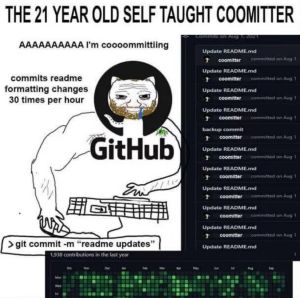GitHub
GitHub: The Wild West of Portfolios, Where Code Cowboys Shoot Blanks (and Sometimes Land Jobs)
Ah, GitHub. The promised land for aspiring programmers, the digital Wild West where lines of code and commit streaks determine your employability. Or does it? Bootcamps might preach its gospel, but let's face it, GitHub profiles are about as reliable as a used car salesman's smile.
Remember when GitHub was young and innocent? Every push felt like a pioneering adventure, every pull request a thrilling duel. But 15 years later, the landscape is littered with abandoned repos, tumbleweeds of half-finished projects, and the occasional astroturfed "contributions" by toddlers with coding superpowers.
I mean, who hasn't considered starting a GitHub for their kid? Just imagine, by the time they graduate, their profile will have the clout of a seasoned gunslinger, ready to take down Silicon Valley! Except, instead of lightning-fast reflexes, they'll have... well, the ability to drool on a keyboard and somehow hit the right buttons.
But hey, at least they might land an internship faster than that poor soul I met, the one with the resume that glittered brighter than a disco ball in a mirror factory. Turns out, their "impressive" contributions were limited to fixing typos in Readme files – using GitHub's fancy web editor, no less. And their "original" website design? More like a clever copy-paste job from someone else's masterpiece.
So, what does a GitHub profile really tell you about a developer? It's a Schrodinger's cat of potential: either you're hiring a genuine open-source hero, or you're welcoming a code chameleon who can blend into any project with the right amount of glitter and smoke.
The truth is, judging a developer solely on their GitHub presence is like picking a horse based on its mane. You might get a champion, or you might end up with a nag prone to panicking every time you ask it to jump over a metaphorical coding hurdle.
So, what's the takeaway? Take those GitHub profiles with a grain of salt, folks. Look beyond the commit numbers and fancy badges. Ask questions, test their skills, and maybe even make them explain how their toddler really became a coding prodigy. After all, in the Wild West of developer recruitment, the only true six-shooter is a sharp mind and a healthy dose of skepticism.
Developer Profile
I don't understand, what are people's thought processes when they do this kind of junk, then apply for a job? It's like they have no foresight, have they even questioned how they are going to perform at the job when they have literally zero knowledge?
Do they think of it like this?
- Create junk commits / copy someone else's website
- Apply for a job and get it
- ...
- Profit?
Making a good profile
GitHub: Beyond the Hype, Crafting a Profile that Shines
While the satire article above paints a humorous picture of the potential pitfalls of relying solely on GitHub profiles, there's no denying its importance in showcasing your skills as a developer. But fret not, code cowboys, for this perspective focuses on actionable advice to make your GitHub profile truly shine:
- Go beyond vanity metrics: Forget about padding your commit history with meaningless changes. Focus on quality contributions, demonstrating your ability to solve problems, collaborate effectively, and follow good coding practices.
- Showcase diverse projects: Don't be a one-trick pony. Have a mix of personal projects, contributions to open-source projects, and perhaps even work-related projects if permitted. This shows your versatility and adaptability.
- Readme, oh Readme!: Treat your readme files like miniature love letters to your projects. Explain the what, why, and how clearly and concisely. Make it easy for anyone to understand and get involved.
- Collaboration is key: Don't shy away from pull requests and contributions to established projects. It shows your ability to work with others, follow guidelines, and handle feedback constructively.
- Make it presentable: Use formatting, syntax highlighting, and even badges to make your profile visually appealing and easy to navigate. First impressions matter, even in the digital world.
- Don't forget the basics: Your profile picture, bio, and location (if comfortable) help personalize your profile and give employers a glimpse into who you are beyond the code.
- Stay active: A stagnant profile might raise red flags. Update your projects, respond to comments, and show that you're engaged with the development community.
- Tailor your profile: Customize your profile to match the specific jobs you're applying for. Highlight the projects and skills relevant to the position, showcasing your value as a potential employee.
- Remember, quality over quantity: It's better to have a few well-developed projects than a multitude of half-finished ones. Focus on showcasing your best work and its impact.
- Be honest and ethical: Don't fabricate contributions or inflate your skills. Authenticity and integrity are highly valued in the tech industry.
Remember, your GitHub profile is a valuable tool, but it's just one piece of the puzzle. Hone your skills, network, and showcase your passion for development – together, these elements will create a compelling picture for potential employers, even if your toddler hasn't quite cracked the coding prodigy code yet.

